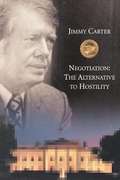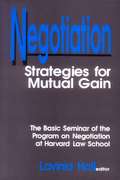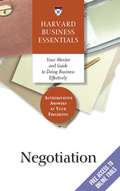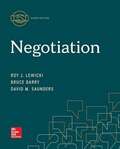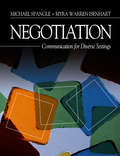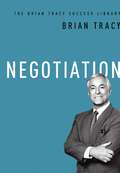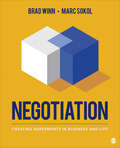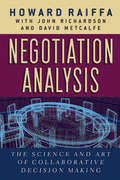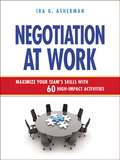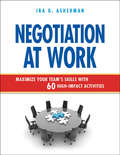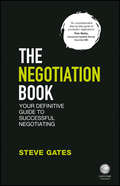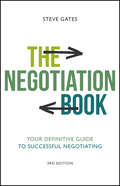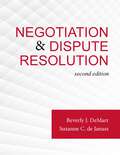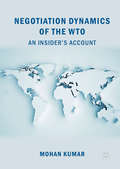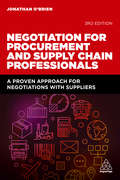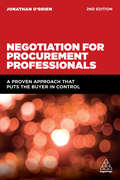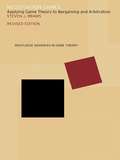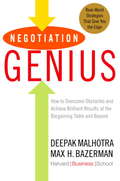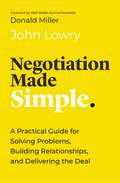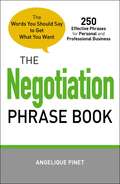- Table View
- List View
Negotiation: The Alternative to Hostility
by Jimmy CarterThis first address of the Carl Vinson Memorial Lecture Series at Mercer University is a masterful assessment of the difficulties of resolving disputes. President Carter's guidelines for establishing a more stable peace in the world are concise and imaginative without sacrificing their essential practicality.
Negotiation: Strategies for Mutual Gain
by Dr Lavinia HallWith contributions from top scholars in the field of negotiation, this clear and entertaining volume effectively blends technique with theory to present frameworks for effective negotiating, analyses of person-to-person negotiating situations and applications in organizational settings. Building on the concept that conflict, when managed well, can provide the impetus for growth, constructive change and mutual benefit, the book is dedicated to breaking the paradigm of winning and losing and transforming negotiation into a search for improved solutions to problems.
Negotiation
by Harvard Business School PressNegotiation--whether brokering a deal, mediating a dispute, or writing up a contract--is both a necessary and challenging aspect of business life. This guide helps managers to sharpen their skills and become more effective deal makers in any situation.
Negotiation
by Roy J. Lewicki David M. Saunders Bruce BarryNegotiation is a critical skill needed for effective management. Negotiation 8e by Roy J. Lewicki, David M. Saunders, and Bruce Barry explores the major concepts and theories of the psychology of bargaining and negotiation, and the dynamics of interpersonal and intergroup conflict and its resolution. It is relevant to a broad spectrum of management students, not only human resource management or industrial relations candidates.
Negotiation: Communication for Diverse Settings
by Dr Michael L. Spangle Dr Myra Warren IsenhartNegotiation is not formulaic. How we negotiate is determined largely by the context in which the negotiation process takes place. Negotiation: Communication for Diverse Settings provides the reader with a comprehensive overview of the negotiation process as it applies to a wide variety of contexts. Skillfully weaving practitioner interviews and real world examples throughout the book, Michael Spangle and Myra Warren Isenhart emphasize the day-to-day relevance of negotiation skill. The authors provide knowledge vital to successful negotiation in a variety of situations, including interpersonal relations, the workplace, shopping and other consumer settings, community relations, and international affairs. Discussions of the moral and ethical dilemmas of negotiation-as well as the detail provided in various sections, such as international negotiations will undoubtedly prove useful to novice and seasoned negotiators alike.
Negotiation: The Brian Tracy Success Library (The\brian Tracy Success Library)
by Brian TracyNegotiation is an essential element of almost all of our interactions--personally and professionally. It's part of how we establish relationships, work together, and arrive at solutions for our clients, our organizations, and ourselves. Simply put, those who don't negotiate well risk falling victim to those who do. Throughout his career, success expert Brian Tracy has negotiated millions of dollars worth of contracts. Now, with this concise guide, you too can become a master negotiator and learn how to: * Utilize the six key negotiating styles * Harness the power of emotion in hammering out agreements * Use time to your advantage * Prepare like a pro and enter any negotiation from a position of strength *Gain clarity on areas of agreement and disagreement * Develop win-win outcomes * Use the power of reciprocity * Know when and how to walk away * Apply the Law of Four * Plus much more Smart negotiation can save you time and money, make you more effective, and contribute substantially to your career. Jam-packed with Brian Tracy's trademark wisdom, this practical and portable book puts the power of negotiation right in your hands.
Negotiation: Creating Agreements in Business and Life
by Brad Winn Marc SokolNegotiation is much more than making a deal; it′s a life skill. Negotiation: Creating Agreements in Business and Life explores the theory and practice of negotiation while unpacking how to develop the head, heart, hand, and stomach of a successful negotiator. Authors Brad Winn and Marc Sokol frame negotiation as a dynamic, creative process that can produce lasting positive results for all parties involved. Practical applications, role-play exercises, and cases provide students with ample opportunities to sharpen their negotiation skills to become confident, capable negotiators in the workplace and in everyday life. Included with this title: LMS Cartridge: Import this title’s instructor resources into your school’s learning management system (LMS) and save time. Don’t use an LMS? You can still access all of the same online resources for this title via the password-protected Instructor Resource Site.
Negotiation: Creating Agreements in Business and Life
by Brad Winn Marc SokolNegotiation is much more than making a deal; it′s a life skill. Negotiation: Creating Agreements in Business and Life explores the theory and practice of negotiation while unpacking how to develop the head, heart, hand, and stomach of a successful negotiator. Authors Brad Winn and Marc Sokol frame negotiation as a dynamic, creative process that can produce lasting positive results for all parties involved. Practical applications, role-play exercises, and cases provide students with ample opportunities to sharpen their negotiation skills to become confident, capable negotiators in the workplace and in everyday life. Included with this title: LMS Cartridge: Import this title’s instructor resources into your school’s learning management system (LMS) and save time. Don’t use an LMS? You can still access all of the same online resources for this title via the password-protected Instructor Resource Site.
Negotiation Analysis: The Science and Art of Collaborative Decision Making
by Howard RaiffaThis masterly book substantially extends Howard Raiffa’s earlier classic, The Art and Science of Negotiation. It does so by incorporating three additional supporting strands of inquiry: individual decision analysis, judgmental decision making, and game theory. Each strand is introduced and used in analyzing negotiations. The book starts by considering how analytically minded parties can generate joint gains and distribute them equitably by negotiating with full, open, truthful exchanges. The book then examines models that disengage step by step from that ideal. It also shows how a neutral outsider (intervenor) can help all negotiators by providing joint, neutral analysis of their problem. Although analytical in its approach—building from simple hypothetical examples—the book can be understood by those with only a high school background in mathematics. It therefore will have a broad relevance for both the theory and practice of negotiation analysis as it is applied to disputes that range from those between family members, business partners, and business competitors to those involving labor and management, environmentalists and developers, and nations.
Negotiation at Work: Maximize Your Team's Skills With 60 High-impact Activities
by Ira AshermanNegotiation is an essential part of doing business, but to be an effective negotiator one must master a wide variety of skills such as listening, self-awareness, conflict resolution, assertiveness, and more. So it stands to reason that in order to teach such a complicated subject, managers and trainers need proven, powerful activities. Negotiation at Work is the answer. The book is packed with 60 interactive lessons designed to instill confidence and transform participants into strong negotiators. Each activity includes a description, detailed directions, goals, additional resources as well as notes for the trainer. The exercises are designed to help learners: * Plan effectively for a negotiation * Ask the right questions * Build trust * Analyze each negotiation creatively * Strategically frame each party's needs and interests * Successfully negotiate with difficult people * Determine their own negotiating style * And much more Featuring transcripts from real negotiations, case studies, assessments, and even practice negotiation sessions, this handy book includes everything readers need to successfully train others in the fine art of negotiation.
Negotiation at Work
by Ira G. AshermanNegotiation is an essential part of doing business, but to be an effective negotiator one must master a wide variety of skills such as listening, self-awareness, conflict resolution, assertiveness, and more. So it stands to reason that in order to teach such a complicated subject, managers and trainers need proven, powerful activities. Negotiation at Workis the answer. The book is packed with 60 interactive lessons designed to instill confidence and transform participants into strong negotiators. Each activity includes a description, detailed directions, goals, additional resources as well as notes for the trainer. The exercises are designed to help learners: * Plan effectively for a negotiation * Ask the right questions * Build trust * Analyze each negotiation creatively * Strategically frame each party's needs and interests * Successfully negotiate with difficult people * Determine their own negotiating style * And much more Featuring transcripts from real negotiations, case studies, assessments, and even practice negotiation sessions, this handy book includes everything readers need to successfully train others in the fine art of negotiation.
The Negotiation Book: Your Definitive Guide to Successful Negotiating
by Steve GatesWinner! - CMI Management Book of the Year 2017 – Practical Manager category Master the art of negotiation and gain the competitive advantage Now revised and updated, the second edition of The Negotiation Book will teach you about one of the most important skills in business. We all have to negotiate at some point; whether in the office or at home and good negotiation skills can have a profound effect on our lives – both financially and personally. No other skill will give you a better chance of optimizing your success and your organization's success. Every time you negotiate, you are looking for an increased advantage. This book delivers it, whilst ensuring the other party also comes away feeling good about the deal. Nothing will put you in a stronger position to build capacity, build negotiation strategies and facilitate negotiations through to successful conclusions. The Negotiation Book: Explains the importance of planning, dynamics and strategies Will help you understand the psychology, tactics and behaviours of negotiation Teaches you how to conduct successful win-win negotiations Gives you the competitive advantage
The Negotiation Book: Your Definitive Guide to Successful Negotiating
by Steve GatesBecome the best negotiator you can be, one manageable step at a time In the newly updated third edition of The Negotiation Book: Your Definitive Guide to Successful Negotiating, distinguished commercial negotiator Steve Gates delivers a singular and practical guide to the art and science of negotiation. Steve Gates is the founder of the world’s leading negotiation consultancy, The Gap Partnership – and the methodology in this book is used by the world’s biggest businesses to successfully execute their strategies. The book lays out the behaviours and traits associated with successful negotiation and offers a comprehensive model for how power, process and behaviour can have substantial impacts on your next negotiation. You’ll also learn how you can shape these factors to optimise value for yourself, your client or your organisation. The author shows you how to secure more agreements and realise more value with every agreement you conclude. Through simple, realistic and hands-on advice, you’ll improve as a negotiator and apply straightforward techniques to the real-world, dynamic environments in which your negotiations take place. You’ll also find: Strategies for maintaining a balanced perspective and keeping your ego in check Maintaining a focus on the interests and priorities of the other party/parties Incremental steps for improving your negotiation ability that are easy to apply and retain This third edition brings the book firmly into the zeitgeist as it considers the very modern challenges presented to commercial negotiators as a result of an ever-changing world, in which they must navigate technological advancements, the post-Covid reality of virtual negotiation, and the impact of war, Brexit and other macro-economic and political developments that are having far-reaching impacts to business and beyond. An invaluable roadmap to becoming a Complete Skilled Negotiator, The Negotiation Book is the negotiation playbook that business leaders, lawyers, consultants and other professionals have been waiting for.
Negotiation & Dispute Resolution
by Beverly J. DeMarr Suzanne de JanaszFormerly published by Chicago Business Press, now published by Sage Negotiation and Dispute Resolution, Second Edition utilizes an applied approach to covering basic negotiation concepts while highlighting a broad range of topics on the subject. Authors Beverly J. DeMarr and Suzanne C. de Janasz help students develop the ability to successfully negotiate and resolve conflicts in a wide variety of situations in both their professional and personal lives.
Negotiation & Dispute Resolution
by Beverly J. DeMarr Suzanne de JanaszFormerly published by Chicago Business Press, now published by Sage Negotiation and Dispute Resolution, Second Edition utilizes an applied approach to covering basic negotiation concepts while highlighting a broad range of topics on the subject. Authors Beverly J. DeMarr and Suzanne C. de Janasz help students develop the ability to successfully negotiate and resolve conflicts in a wide variety of situations in both their professional and personal lives.
Negotiation Dynamics of the WTO: An Insider's Account
by Mohan KumarThe book aims at informing and educating the public at large about the intricacies of the Negotiation Dynamics at the WTO. It traces the period from the launch of the Uruguay Round in 1986 to its conclusion at Marrakesh in 1994 and the subsequent entry into force of the WTO on 1 January 1995.The book shows how WTO Ministerial Conference in Seattle was doomed to fail and its failure led to “trust deficit” between the developed countries on the one hand and certain key developing and least-developed countries on the other. Thus tracing the WTO saga that began in the wake of the failure at Seattle and the difficult path that led to the launch of a new Round at Doha in November 2001.The book throws light on India’s domestic decision-making structure as well as some of the factors driving India’s negotiating stance at the WTO. It also describes the current impasse at the WTO and offers some ideas to revive an institution that is so crucial for the smooth functioning of the multilateral trading system.
Negotiation for Procurement and Supply Chain Professionals: A Proven Approach for Negotiations with Suppliers
by Jonathan O'BrienHighly effective negotiation skills are an essential element of a purchasing and supply chain professional's toolkit. Negotiation for Procurement and Supply Chain Professionals provides a step-by-step approach to delivering winning negotiations and getting game-changing results. It provides purchasers and supply chain managers with the necessary tools and tactics for a detailed, planned approach to negotiation. Negotiation for Procurement and Supply Chain Professionals allows the purchasing professional or the buying team to evaluate the supplier in advance, assess the sales team, and tailor their negotiation strategy depending on concession strategies, cultural influences and game theory. Negotiation for Procurement and Supply Chain Professionals provides a strong framework for discussion in advance of the meeting, allowing the negotiator to plan their agenda, objectives and tactics. Based upon the Red Sheet® Methodology, this book is a proven and collaborative technique used by many companies globally. The new edition includes supply chain planning, updates on multi-party negotiation for supply chain negotiations, Brexit as a retrospective example of negotiation and how the negotiation capability will need to change in the future.
Negotiation for Procurement Professionals: A Proven Approach that Puts the Buyer in Control
by Jonathan O'BrienHighly effective negotiation skills are an essential element of a purchasing professional's toolkit. Negotiation for Procurement Professionals provides a step-by-step approach to delivering winning negotiations and getting game changing results. It provides purchasers with the necessary tools and tactics for a detailed, planned approach to negotiation. Jonathan O'Brien shifts the emphasis away from relying mostly upon personality to a more structured approach that enables anyone to negotiate effectively, even when up against a formidable opponent. This approach allows the purchasing professional or the buying team to evaluate the supplier in advance, assess the sales team, and tailor their negotiation strategy depending on cultural differences, personality traits and game theory. Negotiation for Procurement Professionals provides a strong framework for discussion in advance of the meeting, allowing the negotiator to plan their agenda, objectives and tactics. The book is based upon Red Sheet Methodology, a proven and collaborative technique used by many companies globally. If you are in a buying role, this book will increase your confidence and transform your ability to secure winning outcomes and better business results. Negotiation for Procurement Professionals is the perfect companion to Jonathan O'Brien's other books Category Management in Purchasing and Supplier Relationship Management. Used together, they provide a complete and powerful strategic purchasing toolkit.
Negotiation for Purchasing Professionals
by Jonathan O'BrienBased upon the author's proven Red Sheet methodology, Negotiation for Purchasing Professionals provides a step-by-step approach to delivering winning negotiations and getting game changing results. The author shifts the emphasis away from relying mostly upon personality and tactics used during the negotiation, to a more structured and planned approach that enables anyone to negotiate effectively, even when up against a formidable opponent. This approach allows the purchasing professional or team to evaluate the supplier in advance, assess the sales team, and tailor their negotiation strategy depending on cultural differences, personality traits and game theory. It creates a strong framework for discussion in advance of the meeting, allowing the negotiator to plan their agenda, objectives and tactics.If you are in a buying role, this book will increase your confidence and transform your ability to secure winning outcomes for business results.
Negotiation Games
by Steven Brams Ronald J. Quarles David H. McElreath Michelle E. Waldron David Ethan MilsteinThe concept of negotiation is critical to coping with all manner of strategic problems that arise in the everyday dealings that people have with each other and organizations. Game theory illustrates this to the full and shows how these problems can be solved.This is a revised edition of a classic book and uses some wonderfully adroit case studies t
Negotiation Genius
by Max H. Bazerman Deepak MalhotraFrom two leaders in executive education at Harvard Business School, here are the mental habits and proven strategies you need to achieve outstanding results in any negotiation. Whether you’ve “seen it all” or are just starting out,Negotiation Geniuswill dramatically improve your negotiating skills and confidence. Drawing on decades of behavioral research plus the experience of thousands of business clients, the authors take the mystery out of preparing for and executing negotiations—whether they invol...
Negotiation Genius: How to Overcome Obstacles and Achieve Brilliant Results at the Bargaining Table and Beyond
by Deepak Malhotra Max BazermanFrom two leaders in executive education at Harvard Business School, here are the mental habits and proven strategies you need to achieve outstanding results in any negotiation.Whether you’ve “seen it all” or are just starting out, Negotiation Genius will dramatically improve your negotiating skills and confidence. Drawing on decades of behavioral research plus the experience of thousands of business clients, the authors take the mystery out of preparing for and executing negotiations—whether they involve multimillion-dollar deals or improving your next salary offer.What sets negotiation geniuses apart? They are the men and women who know how to:•Identify negotiation opportunities where others see no room for discussion•Discover the truth even when the other side wants to conceal it•Negotiate successfully from a position of weakness•Defuse threats, ultimatums, lies, and other hardball tactics•Overcome resistance and “sell” proposals using proven influence tactics•Negotiate ethically and create trusting relationships—along with great deals•Recognize when the best move is to walk away•And much, much moreThis book gets “down and dirty.” It gives you detailed strategies—including talking points—that work in the real world even when the other side is hostile, unethical, or more powerful. When you finish it, you will already have an action plan for your next negotiation. You will know what to do and why. You will also begin building your own reputation as a negotiation genius.
Negotiation Made Simple: A Practical Guide for Solving Problems, Building Relationships, and Delivering the Deal (Made Simple Series)
by John LowryNegotiators might be born, but great negotiators are made.This book offers a useful and comprehensive approach to negotiation that can springboard a career or a company, one deal at a time.Business and organizational leaders spend well over half of their professional time engaged in this process. It is the way they do deals, lead employees, and manage relationships. Most leaders learn to negotiate on the job through a long process of trial and error. In today&’s competitive marketplace, there is no time for experimentation, nor room to make mistakes.The good news is by mastering negotiation, the next level of success is actually closer than it appears. The actionable advice and practical guidance offered in this book give a roadmap for every type of negotiation. Through case studies, illustrations, exercises, and personal stories, Lowry shows how to:Make strategic decisions – move from doing what is comfortable to doing what is most strategic.Manage the process – carefully balance the urge to compete with the need to collaborate.Deliver the deal – fine-tune the negotiation process to achieve the desired outcome.This book makes it easy to join the ranks of leaders who have experienced unprecedented success by making negotiation simple.
The Negotiation Phrase Book
by Angelique PinetDo you want to clinch a sale? Get a better salary? Make a terrific deal on a new house?Then get ready to negotiate!Your life is all about bargaining--everything from setting a price with a vendor at work to talking to your teenager at home about an allowance. Experienced negotiators have a huge advantage in these discussions, because they know what words and phrases work. And you can join their ranks.Here's your essential guide to what to say at each stage of the negotiation. You'll learn how to:Evaluate the needs of your negotiating partnerDecide what the other party's words really meanStructure offers and counteroffersDetermine your minimum walkaway pointThe best words will get you the best deal. So get in there and start bargaining!
The Negotiation Phrase Book: The Words You Should Say to Get What You Want
by Angelique PinetDo you want to clinch a sale? Get a better salary? Make a terrific deal on a new house?Then get ready to negotiate!Your life is all about bargaining--everything from setting a price with a vendor at work to talking to your teenager at home about an allowance. Experienced negotiators have a huge advantage in these discussions, because they know what words and phrases work. And you can join their ranks.Here's your essential guide to what to say at each stage of the negotiation. You'll learn how to:Evaluate the needs of your negotiating partnerDecide what the other party's words really meanStructure offers and counteroffersDetermine your minimum walkaway pointThe best words will get you the best deal. So get in there and start bargaining!
